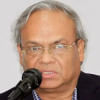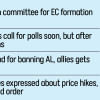Awami League: From progressive politics to fascism

August 5 was a historic day for Bangladesh for more reasons than one. The Awami League (AL), the party whose cause was a cornerstone in Bangladesh's history, was ousted by the masses.
Since independence, political turmoil has been part of narratives closely related to Bangladesh. One of the factors which worked in the AL's favour, from the time the party assumed responsibility in 2009, was that it was regarded as the most progressive and liberal party to have gained power following liberation. At that point in time, AL's values struck a chord with the secular middle-class Bangladeshi. The preceding regimes association with elements such as the military, fundamentalism, and state-centric politics aided in this regard.
Fast forward to 2024, and one finds that the AL-led 14-party alliance's rule is being labelled "fascist."
The AL regime has been somewhat of a conundrum. The Perspective Plan of Bangladesh 2041 (PP 2041), which was published in 2020, envisioned to build on economic advancements and enhance the lives of people. The AL accommodated more public-private partnerships within the media world than any other party before and oversaw the widespread introductions of leading social media websites such as Facebook, YouTube, TikTok, and Instagram. Indeed, the regime looked outwards and allowed creative media productions to be released, which did not always comply with the more conservative National Broadcast Policy of 2014. Accordingly, the party is largely responsible for digitalising a new generation of Bangladeshis, many of whom have smartphones and global aspirations today and took to the streets during the recent protests. Student coordinators such as Nahid Islam and Asif Mahmud are surely part of that generation and are, in fact, products of "Digital Bangladesh."
"Digital Bangladesh" was a pillar that supported the party's return to the centre in 2009 and represented its defiance of right-wing politics. AL's reformist approaches resonated with the masses in the context of globalisation and the interrelatedness of international networks in the 21st century. Their alliance with left-wing parties enabled the AL to stay in power and inspire many in the country. But, as it has transpired, the 14-party alliance seems to have paved the way for more dreams than stairs to reach those ambitions.
The recent movement portrayed the angst and frustration of the people from various sectors in Bangladesh, including journalism. The protests that began in the first week of July should be credited for capturing on-the-ground reactions. The mass killings, detentions, disappearances and violence against unarmed protestors that took place during this movement truly called into question the ethos of AL's political mandate. Over 400 people have lost their lives during the quota reform movement between July 16 and August 4, with some claiming that the number may well be understated. It has also been put forward that hospital records have been tampered with and bodies hidden, further putting into question just how many people have sacrificed their lives to bring an end to AL's rule.
Students have always been integral to the political narrative of Bangladesh. The fall of the Ershad regime was not brought about only by workers, but students as well, who endeavoured to take the nation forward on the path of democracy. Students again played their part in 2008 and 2013, when the Shahbagh Protests signalled their support for secular and not communal politics. In 2024, students took a stance once against the fascist practices of the Awami regime.
The tragic reality is that the AL committed to preserving democracy in the country, but backed the said promise by fascist means. The quota reform movement, which eventually led to the AL government's end, stemmed from opposition to fascist practices which often granted AL supporters, activists, and leaders the license to terrorise communities around the country. Throughout its rule, the former ruling party publicly branded opposition parties, such as the Bangladesh Nationalist Party (BNP), and its allies as being fundamentalist and in conflict with the progressive agenda of the party.
While AL's statement may well be true when considering the realities of grassroots politics and the history of BNP and its allies, the Awami League's ideology also correlated with its globalist persuasions. The AL attained success in this sphere and was able to, for a period since 2009, be the flagbearer of the identity of the modern Bangladeshi. But, at present the premise of AL is being questioned and it remains to be seen how that plays out.
In essence, what the masses including the youths of Bangladesh have conveyed through this movement is that they are averse to right-wing politics in general, and both AL and BNP are considered part of that category today. This is very important to consider as we eventually transition to political-administrative rule again. Only time will tell whether progressive politics really do see the light of day in Bangladesh and who will be the leading stakeholders of the future. Meanwhile, the appointment of Nobel laureate Dr Muhammad Yunus as the chief of the interim government seems to be a step in the right direction.
Nihad Nowsher works in business development.
Views expressed in this article are the author's own.
Follow The Daily Star Opinion on Facebook for the latest opinions, commentaries and analyses by experts and professionals. To contribute your article or letter to The Daily Star Opinion, see our guidelines for submission.

 For all latest news, follow The Daily Star's Google News channel.
For all latest news, follow The Daily Star's Google News channel. 








Comments